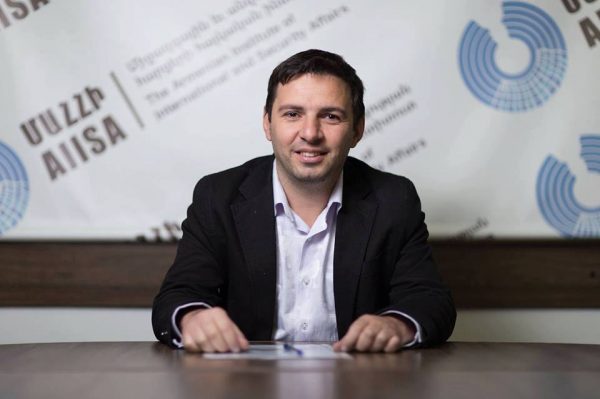According to political scientist, Armen Vardanyan, Russia draws Armenia into anti-Western rhetoric statements
The signing of the statement by Armenia on the deployment of missile defense systems of the Collective Security Treaty Organization (CSTO) member states has caused serious concerns. Particularly the fact that Armenia is drawn in the support of an anti-Western statement, which can cause serious harm to the Armenia-West relations. Note that with this agreement, the member countries have expressed their concern about the growth of factors influencing on the global stability in the world, in particular, the deployment of missile defense systems in various regions.
“Aravot” asked political scientist Armen Vardanyan, an expert of the Institute for International and Security Affairs, to specify why the signing of this statement by Armenia is an anti-western move, and how it will be expressed. Mr. Vardanyan expressed concern that with this move, Armenia actually comes out against the United States, “It is not a secret for anyone that Russia has created the CSTO for serving its own geopolitical interests likewise the USSR created the Warsaw Treaty Organization in counterbalance to NATO. In this context, Russia is trying to draw the CSTO member states into the conflict with the US, which in the near future may become more aggravated because of the available disagreements between the two countries. This is extremely dangerous for Armenia because therewith it actually comes out against the United States, even though everyone understands that our country has joined this statement by the coercion of Russia.”
Armen Vardanyan particularly consider fearsome the fact that Russia does not fulfill its federal commitments in the framework of the CSTO, does not respond to the shelling of border regions of Armenia by Azerbaijan, is arming Azerbaijan, and instead, draws Armenia into the anti-Western rhetoric statements. The political scientist stated as a fact that this is already the second incident happened recently when Moscow is indirectly drawing Yerevan into the conflict with the West. He recalled that just a few months ago, Armenia attended a military exercise organized in the framework of CSTO, where NATO was considered a conventional enemy.
Read also
It is a question whether Armenia had an alternative to avoid appearing in such situations. Armen Vardanyan noted on this, “Armenia should avoid joining such statements for it has quite good relations with the United States and is the only member state of the CSTO that implements an individual partnership program with NATO. In addition, each year, our country is also receiving financial and a small amount of military aid from the US. Hence, joining similar statements does not stem from the interests of Armenia.” The expert explained that the deployment of the anti-missile systems by the United States is not directed against Armenia but a restraining factor for Russia. Therefore, all this stems leads to the fact that as long as Russia does not respect the interests of Armenia, our country must not serve the interests of the Kremlin either.
At the same time, Armen Vardanyan noted that the disagreements between Armenia and Russia are obvious, “At the CSTO summit in Yerevan, it was apparent that there are certain disagreements between Armenia and Russia, which were also mentioned by Russian analysts.” The other disturbing development that stirred the political field of Armenia in recent days and caused fear was Russian Foreign Minister Sergei Lavrov’s statement that Turkey can play a positive role in the settlement of the Nagorno-Karabakh conflict. We asked Armen Vardanyan whether the fears raised around this statement are appropriate in the event when the RA Government’s program stipulates, “normalization of Armenian-Turkish relations without preconditions.”
From Lavrov’s statement to the RA Government program: we asked where these sentiments lead Armenia and what dangerous consequences they can have on Armenia’s foreign policy. The political scientist replied emphasizing that Turkey cannot promote a peaceful settlement of the Karabakh conflict as long as it has an obviously biased approach towards this conflict. If Russia truly wants to promote the development of the Armenia-Turkey relations, then it can exert some pressures on this country, especially given the “thaw” initiated in Russian-Turkish relations.
It is obvious for the political scientist that the improvement in the relations between Armenia and Turkey does not stem from Russia’s interests since the improvement of Armenia-Turkey relations will lead to the fact that Russia will be deprived of some leverages on our country. Back to the provision in the Government Program on the Armenian-Turkish relations without preconditions, Mr. Vardanyan mentioned that Armenia has always stated that it is for the improvement of Armenian-Turkish relations without preconditions but, unfortunately, Turkey continues connecting the improvement of these relations with the Karabakh conflict, and demands Armenia to make concessions in favor of Azerbaijan.
The political scientist urged to be realistic and understand that there will be no breakthrough in Armenian-Turkish relations in the near future. As for the reasons, he notes, “First of all, because Azerbaijan continues to have a great influence on Turkey, which may seem surprising at first glance but Azerbaijan is the biggest investment making country in Turkey, and it leaves its impact also on Erdoğan’s foreign policy on Armenia. Secondly, I am strongly convinced that a progress can be reported in Armenia-Turkey relations in the future if the US exerts serious pressures on Ankara. Currently, Armenia and Turkey are not ready to normalization of the relations without mediators.”
Tatev HARUTYUNYAN
“Aravot”




















































